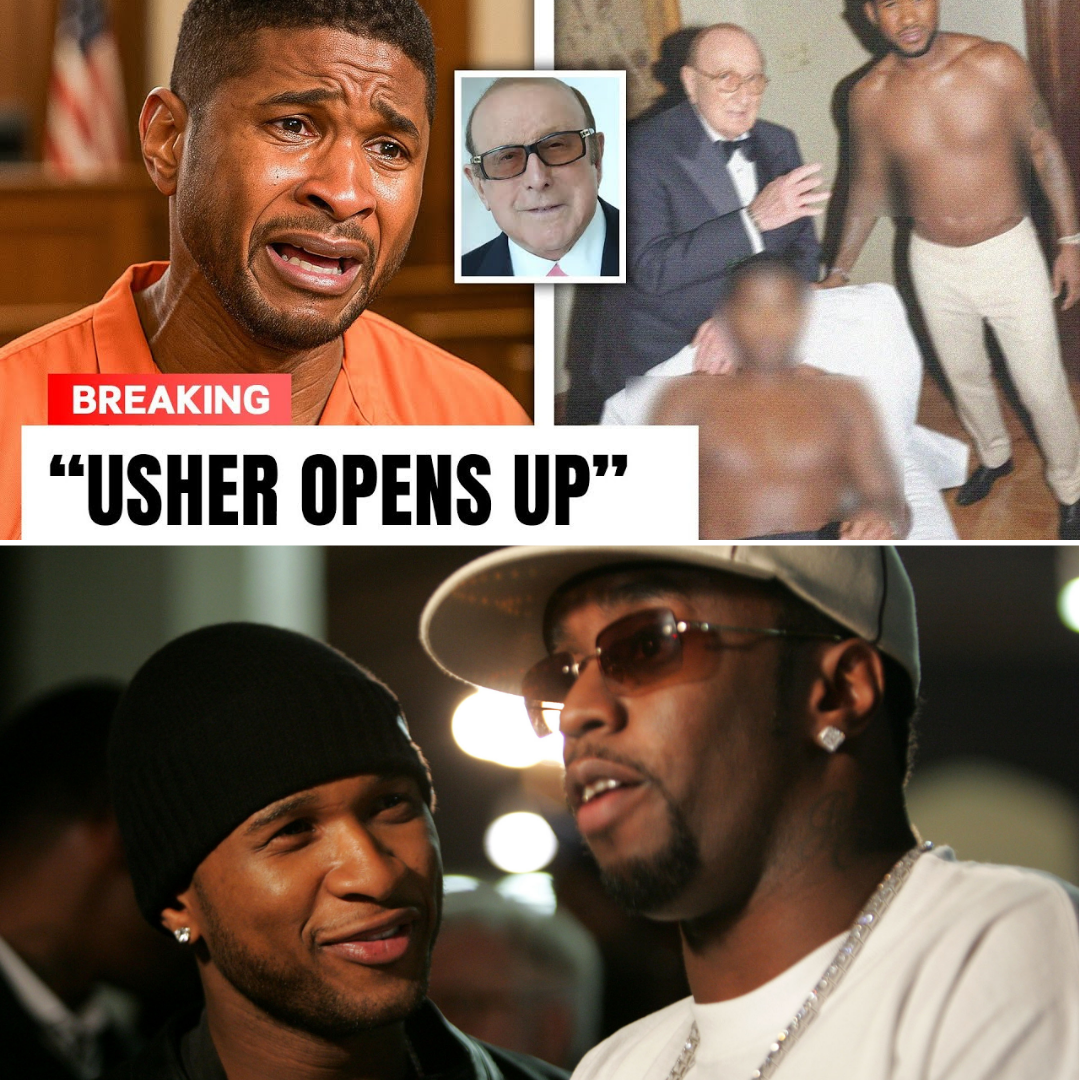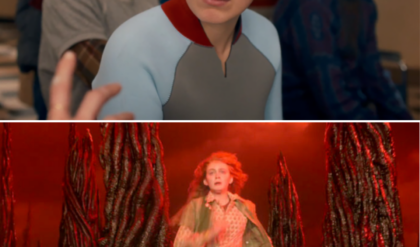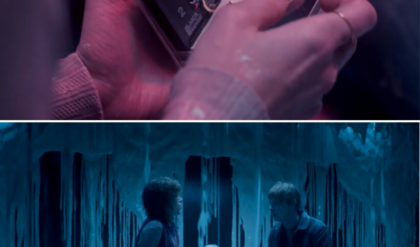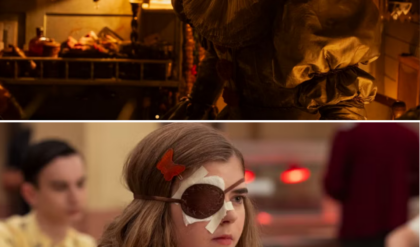Diddy’s Court Drama Unveils Disturbing Allegations About Clive Davis’ Role in Usher’s Early Career
The ongoing federal trial of Sean “Diddy” Combs, which began on May 5, 2025, in Manhattan, has sent shockwaves through the entertainment industry, unearthing troubling allegations about power dynamics, exploitation, and abuse in Hollywood’s music scene. While Combs faces charges of sex trafficking, racketeering, and transportation to engage in prostitution—charges to which he has pleaded not guilty—the courtroom revelations have cast a spotlight on his past relationships with young artists, particularly R&B superstar Usher. Even more startling are the resurfaced claims implicating legendary music mogul Clive Davis in Usher’s formative years, raising questions about the influence and oversight of industry giants during the singer’s adolescence. What is the truth behind these allegations, and why are they captivating the public’s attention?

The Origins of Usher’s “Puffy Flavor Camp”
Usher Raymond IV, now 45, was just 13 years old when he was signed to LaFace Records in 1992 by music executive L.A. Reid. In a pivotal decision that would shape his career, Reid arranged for the young singer to live with Combs in New York in 1994 as part of what was dubbed “Puffy Flavor Camp.” At the time, Combs, then 24, was an ambitious producer and the founder of Bad Boy Records, known for his work with artists like Notorious B.I.G. and Mary J. Blige. Reid, in his 2016 memoir Sing to Me, admitted to feeling uneasy about the decision, describing Combs as “the wildest party guy in the country” and questioning whether it was “irresponsible” to send a teenager to live with him. Despite these reservations, the move was seen as a way to immerse Usher in the gritty, creative energy of New York’s music scene.
During this period, Combs became Usher’s legal guardian and produced his self-titled debut album, released in 1994. However, Usher’s reflections on this time, shared in interviews over the years, paint a troubling picture. In a 2004 Rolling Stone interview, Usher described being exposed to a world of “sex, specifically,” recalling, “You’d open a door and see somebody doing it, or several people in a room having an orgy. You never knew what was going to happen.” In a 2016 appearance on The Howard Stern Show, he called the environment “pretty wild” and said he would never send his own children to such a place, citing “very curious things taking place.” These comments, once anecdotal, have taken on new weight in light of Combs’ trial, where allegations of drug-fueled “freak-off” parties and coercive behavior have dominated testimony.
Clive Davis’ Role: Mentor or Manipulator?
The connection to Clive Davis, the iconic music executive who shaped the careers of artists like Whitney Houston and Alicia Keys, emerges through his professional ties to both Reid and Combs. In the early 1990s, Davis, then head of Arista Records, partnered with Reid’s LaFace Records and later provided Combs with the resources to establish Bad Boy Records. According to Reid’s memoir, Davis was instrumental in giving Combs “the advance, recording studio, and everything he needed” to launch his label. This financial and creative backing positioned Davis as a key figure in the ecosystem that brought Usher under Combs’ wing.
Recent speculation, amplified by posts on X and online discussions, has pointed to Davis’ influence as potentially problematic. Some have questioned whether Davis, as a powerful overseer, was aware of or complicit in the environment Usher was exposed to at such a young age. A Reddit thread from August 2024 speculated about “rich-old-white-men-perversion-and-privilege” in the industry, with users naming Davis alongside other executives. While no concrete evidence from the trial directly implicates Davis in wrongdoing, the resurfacing of Usher’s past comments has fueled public curiosity about the extent of Davis’ oversight—or lack thereof—during this period. Davis, now 93, has not publicly commented on these allegations, and his representatives have not responded to inquiries about his involvement with Usher’s early career.
The Trial’s Revelations: Usher’s Name in the Spotlight
Although Usher has not testified in Combs’ trial as of May 29, 2025, his name has surfaced in court through the testimony of Dawn Richard, a former member of the girl group Danity Kane, signed to Combs’ Bad Boy Records. On May 19, Richard testified that she witnessed Combs assault his then-girlfriend, Casandra “Cassie” Ventura, at a West Hollywood restaurant in 2010, with Usher, Ne-Yo, and Interscope Records co-founder Jimmy Iovine allegedly present. Richard described Combs punching Ventura in the stomach during a private conversation, after which Ventura “immediately bent over and left.” While it remains unclear whether Usher directly witnessed the incident, the mention of his presence has reignited scrutiny of his long-standing relationship with Combs.
False rumors, propagated by an AI-generated YouTube video from the channel WhatIsMyStarWorth, claimed Usher testified in court, alleging disturbing experiences with Combs at age 14. The video, titled “1 MINUTE AGO: Usher Breaks Down in Court, Reveals What Diddy Did to Him at 14…,” garnered over 3 million views before being debunked by outlets like Snopes and Times Now as fictional content designed for entertainment and ad revenue. Despite the misinformation, the video’s traction underscores the public’s fascination with Usher’s early years under Combs’ guardianship and the broader implications for the music industry.
A Troubling Pattern of Allegations
The trial has also shed light on Combs’ alleged pattern of controlling and abusive behavior, which some speculate may extend to his mentorship of young artists like Usher. Cassie Ventura, a key witness, testified over four days about enduring a decade of physical and emotional abuse from Combs, including coerced participation in “freak-off” sex parties. Other witnesses, including Combs’ former assistant David James and Ventura’s mother, Regina Ventura, have corroborated allegations of violence and manipulation. James testified that he urged Ventura to leave Combs, but she felt trapped, citing Combs’ control over her career and finances. These accounts have prompted comparisons to Usher’s situation, where a young artist, dependent on Combs for guidance and success, may have been vulnerable to exploitation.
Posts on X have further amplified these concerns, with users referencing unverified claims from Combs’ former bodyguard, Gene Deal, who alleged in a 2024 interview that music executives were aware of inappropriate behavior involving Usher during his time with Combs. These claims remain unsubstantiated and should be approached with skepticism, as they lack corroboration from credible sources. However, they contribute to a narrative of systemic issues within the industry, where young talents are often placed in precarious situations under the guise of mentorship.
The Industry’s Dark Underbelly
The allegations surrounding Combs, Davis, and Usher point to broader systemic issues in the music industry, where power imbalances between executives, producers, and young artists can foster environments ripe for exploitation. The trial’s focus on Combs’ alleged “freak-off” parties, described as drug-fueled sexual marathons involving coercion, has drawn parallels to other high-profile scandals, such as those involving Jeffrey Epstein and Harvey Weinstein. The resurfacing of Usher’s comments about witnessing orgies and drug use at Combs’ home has led some to question whether such environments were normalized or overlooked by industry gatekeepers like Davis, who wielded immense influence over artists’ careers.
Public sentiment, as seen in online discussions, reflects growing distrust of the entertainment industry’s handling of young talent. A 2013 speech by Usher, reported by Daily Mail, credited Combs with introducing him to “parties, women, sex, and drugs,” though he emphasized that he “never let it take me over.” While Usher has not publicly addressed the trial or the allegations about Davis, his decision to scrub his X profile in September 2024—later attributed to a hack—sparked speculation about his desire to distance himself from the controversy.
What Does This Mean for Usher and Hollywood?
For Usher, now a Grammy-winning artist and global icon, the trial represents a complex reckoning with his past. His success, built on the foundation of his early work with Combs and LaFace Records, is undeniable, but the allegations surrounding his teenage years raise questions about the cost of that success. Usher has remained silent on the trial, and his representatives have not commented on the restaurant incident or the speculation about Davis. His focus appears to be on his ongoing career, with a sold-out Past Present Future tour and recent collaborations with artists like Beyoncé.
For Clive Davis, the allegations, though unproven, add a layer of scrutiny to his storied legacy. As a figure who has shaped modern music for decades, Davis’ association with Combs and Reid places him in a narrative of industry accountability. Without direct evidence of wrongdoing, these claims remain speculative, but they underscore the need for greater transparency and protection for young artists in the music industry.
Looking Ahead: A Trial That Could Change the Industry
As Combs’ trial continues, expected to last until early July 2025, more revelations are likely to emerge, potentially implicating other figures in the entertainment world. The prosecution has called 16 witnesses in the first two weeks, including former employees and associates who have painted a damning picture of Combs’ behavior. While Usher is not expected to testify, his name’s recurring presence in court underscores the enduring impact of his time with Combs. For Davis, the trial serves as a reminder of the responsibility that comes with wielding influence over young talent, even if his involvement was indirect.
The public’s fascination with this scandal reflects a broader demand for accountability in Hollywood, where stories of abuse and exploitation have become all too common. Whether the trial will lead to concrete changes in how the industry protects its artists remains to be seen, but for now, the allegations about Combs, Davis, and Usher have sparked a conversation that shows no signs of slowing down. As the world watches, one thing is clear: the truth behind Usher’s early years is more complex—and more troubling—than anyone could have imagined.





